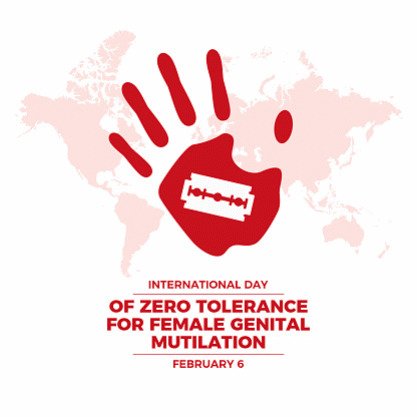International Day of Zero Tolerance for Female Genital Mutilation 2025: #HerVoiceMatters in the Global Movement to End Female Genital Mutilation

Marked on February 6, the International Day of Zero Tolerance for Female Genital Mutilation underscores the urgent need to eliminate a practice that infringes upon the human rights and health of millions of women and girls worldwide. Established by the United Nations General Assembly in 2012, this observance advocates for intensified global efforts to eradicate female genital mutilation by 2030, aligning with Sustainable Development Goal 5.
The theme for 2025, “Her Voice. Her Future,” emphasizes the critical role of collective action in the fight against female genital mutilation.
The World Health Organization (WHO) defines female genital mutilation (FGM) as any practice that involves the partial or complete removal of a woman’s external genitalia or injury to her female genital organs for non-medical reasons.
Although there are no advantages attached to it for women or girls, the procedure can cause significant bleeding, urination issues, cysts, menstrual problems, infections, difficult births, and a higher risk of neonatal fatalities.
Female genital mutilation is traditionally concentrated in 30 countries across Africa, the Middle East, and some parts of Asia and Latin America. However, it persists globally, including among migrant communities in Europe, North America, and Oceania. While a girl is now one-third less likely to undergo this harmful practice than 30 years ago, over 200 million women and girls have already been affected, with 4.4 million girls estimated to be at risk in 2025 alone.
Types of Female Genital Mutilation
FGM is classified into four main types:
- Type I: Partial or total removal of the clitoris and/or the clitoral hood.
- Type II: Partial or total removal of the clitoris and labia minora, with or without the removal of the labia majora.
- Type III: Also known as infibulation, this involves narrowing the vaginal opening by creating a seal, often through the removal of the labia minora or majora and stitching, leaving only a small hole for menstrual blood and urine.
- Type IV: All other harmful procedures to the female genitalia for non-medical purposes, including pricking, piercing, cutting, scraping, and cauterization.
Health and Psychological Consequences
FGM has severe consequences for women and girls which includes:
- Chronic pain and recurrent infections
- Hemorrhaging and increased risk of childbirth complications
- Infertility and long-term reproductive issues
- Psychological trauma, including PTSD, anxiety, and depression
- Sexual dysfunction and severe distress in marital relationships
Legal Framework and Global Efforts to Eradicate FGM
Over 60 countries have laws against FGM, with some enforcing strict penalties. International bodies such as the UN, WHO, and UNICEF continue to push for policy changes, education programs, and community engagement to end the practice.
The UNFPA-UNICEF Joint Programme is the world’s largest initiative to accelerate the elimination of FGM, working in 17 African and Middle Eastern countries. The global movement also includes grassroots organizations, survivor networks, and government partnerships working toward the eradication of FGM by 2030.
Recommendations to End Female Genital Mutilation
- Strengthening Laws and Policies – Governments must implement and enforce laws banning FGM.
- Community Engagement and Education – Awareness campaigns should be conducted in affected regions to challenge harmful social norms and raise awareness.
- Empowering Survivors and Girls at Risk –Providing support networks and educational opportunities for survivors helps prevent FGM for future generations.
- Healthcare Support and Intervention – Medical and psychological support should be accessible to affected women and girls.
- Global Advocacy and Funding – International organizations and governments must invest in programs aimed at eradicating FGM worldwide.
Conclusion
The International Day of Zero Tolerance for Female Genital Mutilation is a reminder that traditions should never come at the cost of a child’s health, dignity, and rights. While progress has been made, millions of our precious girls remain at risk. By raising awareness, supporting education, and advocating for legal protections, we can work toward a world where no girl child has to endure this harmful practice.
The call to abolish female genital mutilation is not just a health necessity but a human rights imperative, ensuring justice and equality for girls and women all over the world.
Image Source: http://www.bing.com





